|
|
|
Sort Order |
|
|
|
Items / Page
|
|
|
|
|
|
|
| Srl | Item |
| 1 |
ID:
169101
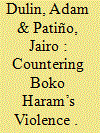

|
|
|
|
|
| Summary/Abstract |
This article examines efforts to counter Boko Haram’s campaign of terrorism in Northern Nigeria from a deterrence–backlash perspective. Drawing from previous research, the authors develop hypothetical expectations for deterrence and backlash effects when counterterrorism policies are conducted at governmental and community levels. Using parametric survival analysis, the authors conclude that government policies designed to curb Boko Haram attacks resulted in backlash. Conversely, community-based efforts resulted in deterrence.
|
|
|
|
|
|
|
|
|
|
|
|
|
|
|
|
| 2 |
ID:
169100


|
|
|
|
|
| Summary/Abstract |
Commenters often criticize the mass media for providing audiences a narrow and inaccurate representation of U.S. military veterans. This study examined the claim by researching how regional news publications in the 50 states represented veterans on Twitter. A quantitative content analysis documented the presence or absence of characteristics in 1,460 tweets that employed the terms veteran or veterans. Data were examined using cluster analysis. Three frames emerged. The most prevalent frame, labeled charity, highlighted instances in which veterans received assistance from charitable organizations and others. The second frame, hero, contained references to honor, World War II, and content that would elicit pride from audience members. The third frame, victim, highlighted the mistreatment of veterans by the military and/or society, mental health issues, politics, and the Gulf War. Results suggest U.S. news consumers are provided a narrow representation of what it means to be a veteran.
|
|
|
|
|
|
|
|
|
|
|
|
|
|
|
|
| 3 |
ID:
169098
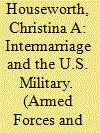

|
|
|
|
|
| Summary/Abstract |
This article uses a comprehensive descriptive analysis to examine the determinants of racial intermarriage for native-born men and women using the 2012 American Community Survey. A comparison between military and civilian samples is the main focus of the article. We improve upon the existing literature by identifying the proximity of the respondent’s current residence to a military base and including an analysis of anti-miscegenation laws by state. Further, we provide a cohort analysis to parse out generational differences. We find that military members are more likely to intermarry, regardless of cohort, and that non-White military members have higher rates of education than their civilian counterparts. Black females in the military are more educated and have a significantly higher rate of intermarriage than their civilian counterparts. Additionally, the difference in intermarriage rates between civilian and military members is 31 percentage points higher for Black women than Black men.
|
|
|
|
|
|
|
|
|
|
|
|
|
|
|
|
| 4 |
ID:
169096
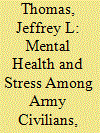

|
|
|
|
|
| Summary/Abstract |
When military community closure occurs, it can be challenging for service members and the surrounding community. Given that services and social networks disappear; this is particularly salient in overseas locations. Few studies have systematically assessed the impact of base closure on military community members. In the present study, 743 soldiers, 114 Army civilian employees, and 54 military spouses living in two closing U.S. military communities in Germany were surveyed about transformation stressors, mental health, and factors associated with better adjustment such as individual coping, leadership behaviors, and community cohesion. While individual coping was associated with fewer sleep problems, and individual coping and leadership were associated with less psychological distress, community cohesion generally overrode these effects in the final step of regression models. Thus, while coping and leadership are important, community connection appears to confer benefits to the affected individuals even in the context of base closure.
|
|
|
|
|
|
|
|
|
|
|
|
|
|
|
|
| 5 |
ID:
169097
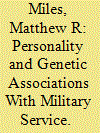

|
|
|
|
|
| Summary/Abstract |
Existing literature connects military service to regional characteristics and family traditions, creating real distinctions between those who serve and those who do not. We engage this discussion by examining military service as a function of personality. In the second portion, we examine military service as predisposed by genetics. Our findings indicate there is a significant heritability component of serving in the military. We find a significant genetic correlation between personality traits associated with progressive political ambition and military service, suggesting that military service represents a different form of political participation to which individuals are genetically predisposed. We discuss the long-term implications of our findings for policy makers and recruiters.
|
|
|
|
|
|
|
|
|
|
|
|
|
|
|
|
| 6 |
ID:
169099


|
|
|
|
|
| Summary/Abstract |
Why would politicians recruit soldiers for military coups d’état? The civil–military relations literature assumes politicians aspire to supremacy over the military; enabling praetorianism would risk their future rule. While civil–military relations widely recognizes the empirical fact of civilian participation in military takeovers, no study specifies or theorizes the topic. This essay examines the conditions in which politicians recruit soldiers to seize power by investigating the understudied processes of military takeovers. Using British Foreign Office documents, Arabic language memoirs, and Polity data, I find that civilian statesmen in Iraq (1936) and Syria (1951) could not tolerate their civilian rivals’ incumbency but were unable to challenge them peacefully, so they recruited like-minded officers for coups. This suggests that while politicians do not necessarily want the army in the chambers, they sometimes favor praetorianism to the continued rule of their civilian opponents.
|
|
|
|
|
|
|
|
|
|
|
|
|
|
|
|
| 7 |
ID:
169095
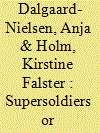

|
|
|
|
|
| Summary/Abstract |
Special Operations Forces (SOFs) are increasingly central in national defense postures worldwide. The term “SOF mind-set” encapsulates the current political enthusiasm but is rarely explicitly defined or systematically studied. Based on a literature review, this article suggests a conceptual model of SOF’s mind-set, which is refined via a Danish case study. It discusses when and where this mind-set complicates collaboration with the wider military organizational environment and how SOF could navigate potential fault lines. By systematically unpacking SOF’s mind-set, the article aims to add nuance to polarized conceptions and stereotypes.
|
|
|
|
|
|
|
|
|
|
|
|
|
|
|
|
| 8 |
ID:
169102


|
|
|
|
|
| Summary/Abstract |
This article engages in an analysis of contemporary relations between civic actors and state power structures, notably the military organization, in the Russian Federation. The main focus is on the complex tension and interaction between state-sanctioned forms of control of the armed forces and public control, exercised by grassroots actors. The underlying assumption is that an institutionalization of control of state power structures is taking place in Russia. The article seeks to understand whether these processes are prevalently a top-down or a bottom-up phenomenon, how public control as a “civic duty” can be effectively characterized, and what implications this has for Russian civic activism more generally.
|
|
|
|
|
|
|
|
|
|
|
|
|
|
|
|
|
|
|
|
|